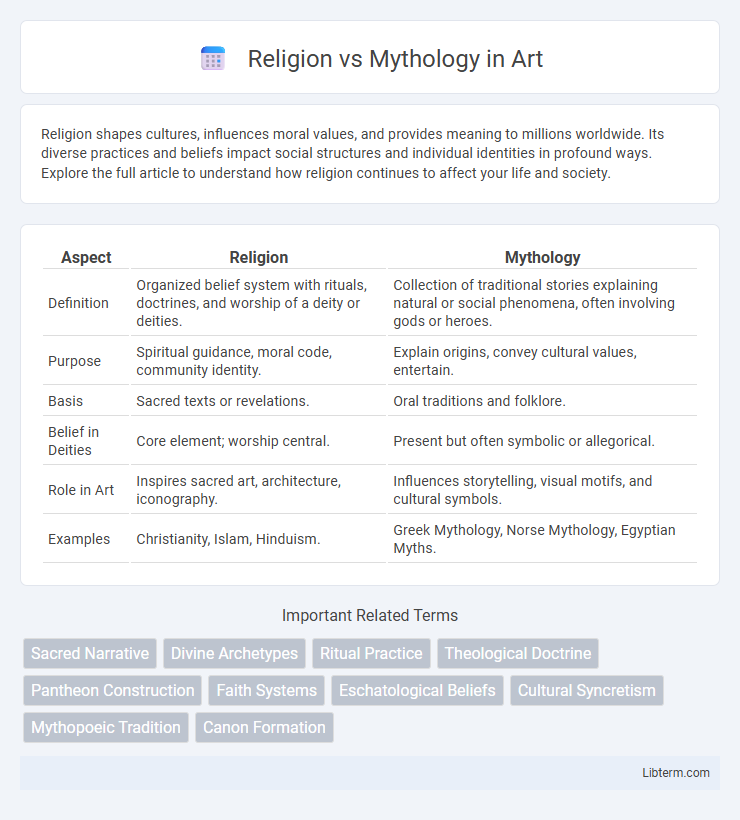Religion shapes cultures, influences moral values, and provides meaning to millions worldwide. Its diverse practices and beliefs impact social structures and individual identities in profound ways. Explore the full article to understand how religion continues to affect your life and society.
Table of Comparison
| Aspect | Religion | Mythology |
|---|---|---|
| Definition | Organized belief system with rituals, doctrines, and worship of a deity or deities. | Collection of traditional stories explaining natural or social phenomena, often involving gods or heroes. |
| Purpose | Spiritual guidance, moral code, community identity. | Explain origins, convey cultural values, entertain. |
| Basis | Sacred texts or revelations. | Oral traditions and folklore. |
| Belief in Deities | Core element; worship central. | Present but often symbolic or allegorical. |
| Role in Art | Inspires sacred art, architecture, iconography. | Influences storytelling, visual motifs, and cultural symbols. |
| Examples | Christianity, Islam, Hinduism. | Greek Mythology, Norse Mythology, Egyptian Myths. |
Defining Religion and Mythology
Religion encompasses organized systems of beliefs, practices, and moral codes centered around the worship of deities or supernatural forces, often providing frameworks for community, ethics, and existential meaning. Mythology consists of traditional stories and legends that explain natural phenomena, cultural origins, and human experiences through symbolic narratives involving gods, heroes, and fantastical beings. While religion operates as a lived faith with rituals and spiritual commitments, mythology functions as a collection of cultural tales that shape collective identity and worldview.
Historical Origins and Development
Religion and mythology both stem from ancient human attempts to explain natural phenomena and life's mysteries, with religion evolving structured doctrines and rituals centered around worship and moral codes. Historical origins of religion trace back to organized belief systems like Mesopotamian polytheism and early Judaism, while mythology comprises traditional stories such as Greek and Norse myths that convey cultural values and cosmological concepts. Over time, religions developed institutional frameworks, sacred texts, and global followings, whereas mythology often remained part of oral traditions and cultural heritage.
Core Functions and Purposes
Religion structures communal beliefs and practices centered on worship, moral codes, and divine interaction to provide meaning, guidance, and social cohesion. Mythology conveys foundational narratives explaining natural phenomena, origins, and cultural values through symbolic stories that shape identity and collective memory. Both serve essential roles in establishing ethical frameworks, interpreting existence, and reinforcing societal norms across cultures.
Belief Systems and Sacred Narratives
Religion encompasses organized belief systems centered on worship, rituals, and moral codes often grounded in sacred texts and doctrines, fostering a community of faith. Mythology consists of traditional stories explaining natural phenomena, gods, and cultural origins, serving as allegorical narratives that shape cultural identity and moral values. Both belief systems and sacred narratives function to provide meaning, social cohesion, and explanations for existential questions, though religion typically involves active worship while mythology primarily offers symbolic storytelling.
Rituals, Practices, and Traditions
Religion is characterized by structured rituals and sacred practices that often involve worship, prayer, and moral codes rooted in divine authority. Mythology encompasses traditional stories and symbolic narratives that explain natural phenomena and human experiences, with rituals derived from these tales often serving cultural or educational purposes. Both systems preserve rituals and traditions, but religion typically mandates adherence for spiritual connection, while mythology's practices are more interpretive and storytelling-based.
Authority and Sacred Texts
Religion often relies on authoritative sacred texts considered divinely inspired and immutable, such as the Bible, Quran, or Vedas, which guide moral conduct and rituals. Mythology comprises traditional stories passed down through generations without a centralized authority, serving to explain natural phenomena and cultural origins but lacking universally accepted sacred scriptures. The authority of religion stems from institutionalized doctrines and clergy, whereas mythology functions more as a cultural narrative without formalized ecclesiastical endorsement.
Community and Social Impact
Religion fosters cohesive communities through shared beliefs, rituals, and moral codes, promoting social stability and collective identity. Mythology shapes cultural narratives and values, influencing social norms and offering a sense of belonging rooted in ancestral stories. Both religion and mythology impact social structures by guiding behavior, reinforcing traditions, and strengthening communal bonds.
Evolution and Adaptation Over Time
Religion and mythology have evolved and adapted over time, reflecting changing cultural, social, and historical contexts. Sacred texts, rituals, and deities often undergo reinterpretation to maintain relevance within contemporary communities. This dynamic evolution highlights the fluid boundaries between religious belief systems and mythological narratives across civilizations.
Intersection and Overlap Between Religion and Mythology
Religion and mythology intersect through shared narratives that convey core beliefs, values, and cosmologies, often involving deities, creation stories, and moral codes. Both utilize symbolic stories to explain the origins of the world, human existence, and natural phenomena, blurring distinctions between sacred traditions and cultural myths. This overlap highlights how mythological elements underpin many religious doctrines, shaping rituals and collective identities across civilizations.
Modern Perspectives and Relevance
Modern perspectives on religion and mythology emphasize their distinct roles in shaping cultural identity and moral frameworks. Religion is often viewed as a living system of beliefs and practices tied to spiritual experience and community, while mythology is considered a collection of symbolic narratives that explain natural phenomena and human origins. Both remain relevant as tools for understanding human psychology, social cohesion, and historical worldview evolution in contemporary society.
Religion Infographic

 libterm.com
libterm.com